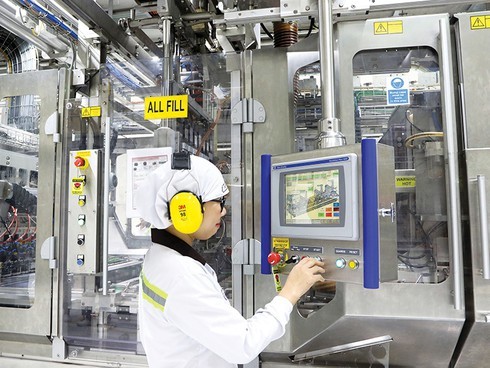 |
On January 10, the annual Vietnam Business Forum (VBF) will take place in Hanoi, providing a chance for enterprises to directly meet with the government to talk about their issues and plans.
To be held following the government’s issuance of Resolution No.02/NQ-CP on tasks and measures to improve the investment environment and increase national competitiveness in 2020, the government’s strong determination to increase attraction ahead of the new decade is being consolidated.
Themed “Roles and Support of the Business Community in Rapid and Sustainable Development”, the most prestigious policy dialogue between the government and business community concentrates on how to regulate for sustainability, building sustainability and green growth together, along with soft and hard infrastructure innovation in tourism, investment and trade, tax and customs, agriculture, power and energy, capital markets, infrastructure, and also in human resources.
Increasing roles in new era
These talking points are not new at the VBF. However, this time they are aimed at further increasing the role of the business community to enable them to become a driving force of the economy and solutions for high quality sustainable and innovative investment, amid the wider influence of Industry 4.0.
According to the European Chamber of Commerce in Vietnam (Eurocham), groups such as the Singapore Business Association in Vietnam and German Industry and Commerce in Vietnam have members who are preparing for new investment in the country for the digital age.
The associations can contribute more to the Southeast Asian country’s sustainability by providing finance and technological expertise only when the barriers to collaboration are removed, Eurocham explained.
At the VBF event, tax and customs are expected to be discussed among business associations, especially the application of special consumption tax on sugary drinks, corporate income tax, tax refunds, and VAT as well as auto import procedures and overtime.
Japanese investors, in particular, are expecting clear regulations permitting land acquisitions and commercial transactions. “To attract investment in the high-tech sector, incentives are important, but they should be easier to apply,” said Takeo Nakajima, chief representative of the Japan External Trade Organization’s Hanoi Office.
Many Japanese firms have also complained that the sudden removal of the reduction of 50 per cent in personal income tax in special economic zones has negatively impacted businesses’ profit and capital strategies.
With sustainability now a prominent target, the Vietnamese government, as well as domestic and international businesses, took strong actions on sustainable development over the past year. As shown in the national Socio-economic Development Plan for the 2021-2030 period, the UN 2030 Agenda for Sustainable Development enjoys strong support.
In 2019, Vietnam saw strong movements among foreign-invested enterprises (FIEs) in some huge projects in manufacturing and green and clean energy sectors, using their technologies and know-how. For instance, German enterprises expanded their investments in Vietnam, not only in production but also in R&D centres, training, and technical centres in many provinces.
Vietnam made progress in other areas during the year, with the country’s ease of doing business score rising to 69.8 points versus the previous year’s score of 68.6, according to the World Bank Group’s latest Doing Business 2020 study.
The nation’s competitiveness also improved by 10 places, from 77th in 2018 to 67th according to the World Economic Forum (WEF). However, Vietnam only ranks mid-table within the ASEAN.
New moves afoot
In a bid to increase support from the business community in the country’s sustainable development, the Vietnamese government on January 1 issued Resolution 02, setting out seven key tasks and measures specifically to ministries, agencies, and local governments. The resolution focuses on improving the business climate ranking and business conditions, promoting the ASEAN and national one-door customs mechanism, promoting non-cash payment and fourth-level online public services, and developing innovative startups.
Under the new resolution, starting a business, granting a construction license, credit access, registration of assets, and settlement of contract disputes and business bankruptcy are the areas for further improvement.
In the first quarter of 2020 the Ministry of Finance plans a revision of Decree No.139/2016/ND-CP on fees and charges towards extending the time to declare and pay license fees to January 30 of the following year. The ministry will also promote the application of e-invoices in line with 2018’s Decree No.119/2018/ND-CP prescribing electronic invoices for sale of goods and provision of services.
The Ministry of Labour, Invalids, and Social Affairs will work with the Ministry of Planning and Investment (MPI) on developing an e-portal on labour information. This portal will be linked with a national information system on business registration, with plans to finish it in the fourth quarter of 2020.
Meanwhile, the MPI is to complete amendments to the Law on Enterprises and submit it to the National Assembly in May. The amendments will aim to remove or simplify unnecessary procedures to reduce market entry cost and time.
The Ministry of Construction also intends to streamline the license granting process. It will look to shorten the time taken to grant a license, reduce inspection numbers, and ensure that inspections will last for no more than 50 days.
To improve credit access among businesses, the Ministry of Justice will complete its amendment of the decree guiding the implementation of the Civil Code 2015 on secured transactions. The ministry will also work with the Ministry of Natural Resources and Environment and other relevant ministries and agencies to complete a legal framework on online land transactions, including a secure method of transferring land use rights and land-associated assets.
Half of the items subject to specialised inspection, which is a major concern among foreign-invested firms, will be removed. In the second quarter, reorganisation of the apparatus for specialised inspection under relevant ministries will be completed and streamlined.
These fresh bold moves are expected to allay the fears of foreign business interests and herald a new wave of high-quality overseas investment in Vietnam in the months to come. VIR

Changing global business climate strikes Vietnam firms
Changes in the global business environment, along with newly issued regulations and guidance on corporate income tax obligations, have been substantially affecting the operations of many businesses in Vietnam.
 Investors will enjoy more favourable conditions with regards to starting a business, tax, credit access, and investment protection in 2020 buoyed by the Vietnamese government’s latest action plans.
Investors will enjoy more favourable conditions with regards to starting a business, tax, credit access, and investment protection in 2020 buoyed by the Vietnamese government’s latest action plans.